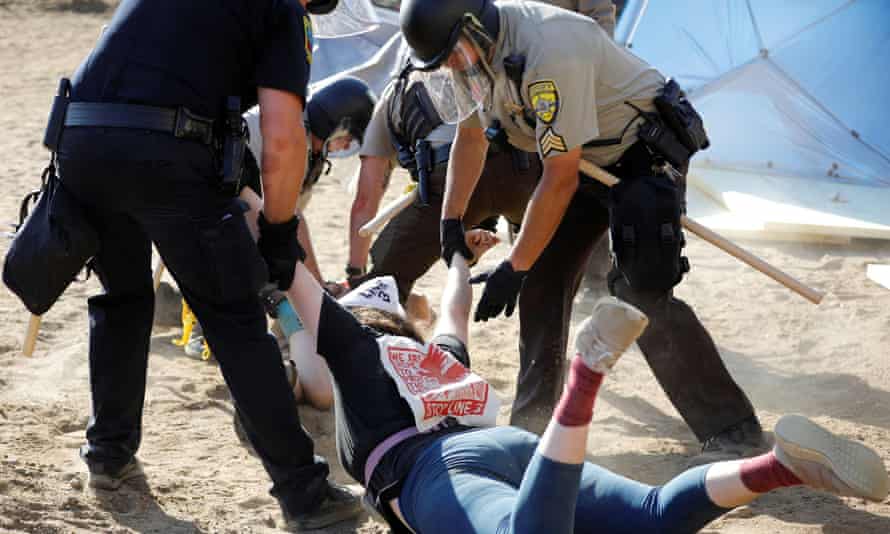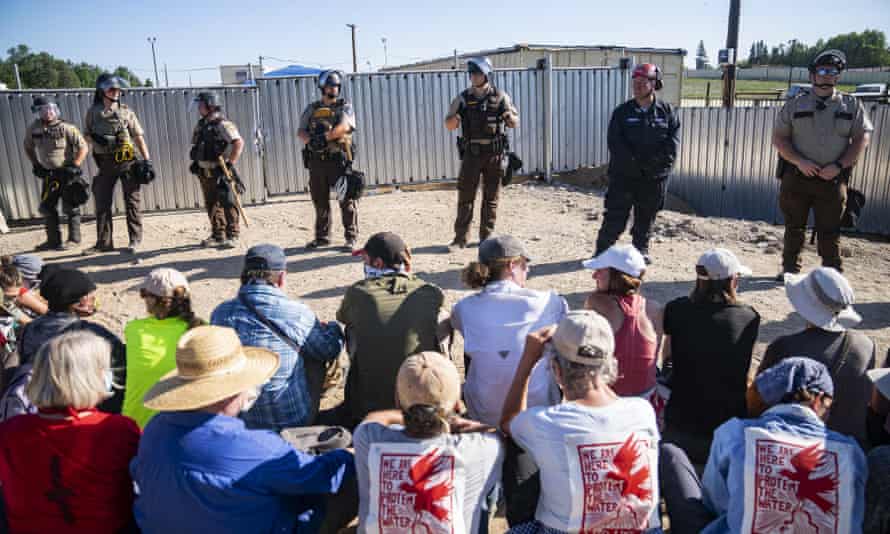Enbridge picked up the tab for police wages, training and equipment – and let county police know when it wanted demonstrators arrested

Police officers drag a demonstrator who was protesting at an Enbridge pump station construction site in Hubbard county, Minnesota, in June. Photograph: Nicholas Pfosi/Reuters
Hilary Beaumont
Tue 5 Oct 2021 12.00 BST
The Canadian company Enbridge has reimbursed US police $2.4m for arresting and surveilling hundreds of demonstrators who oppose construction of its Line 3 pipeline, according to documents the Guardian obtained through a public records request.
Enbridge has paid for officer training, police surveillance of demonstrators, officer wages, overtime, benefits, meals, hotels and equipment.
Enbridge is replacing the Line 3 pipeline through Minnesota to carry oil from Alberta to the tip of Lake Superior in Wisconsin. The new pipeline carries a heavy oil called bitumen, doubles the capacity of the original to 760,000 barrels a day and carves a new route through pristine wetlands. A report by the climate action group MN350 says the expanded pipeline will emit the equivalent greenhouse gases of 50 coal power plants.

Hilary Beaumont
Tue 5 Oct 2021 12.00 BST
The Canadian company Enbridge has reimbursed US police $2.4m for arresting and surveilling hundreds of demonstrators who oppose construction of its Line 3 pipeline, according to documents the Guardian obtained through a public records request.
Enbridge has paid for officer training, police surveillance of demonstrators, officer wages, overtime, benefits, meals, hotels and equipment.
Enbridge is replacing the Line 3 pipeline through Minnesota to carry oil from Alberta to the tip of Lake Superior in Wisconsin. The new pipeline carries a heavy oil called bitumen, doubles the capacity of the original to 760,000 barrels a day and carves a new route through pristine wetlands. A report by the climate action group MN350 says the expanded pipeline will emit the equivalent greenhouse gases of 50 coal power plants.

Sections of the Enbridge Line 3 pipeline near La Salle Lake state park in Solway, Minnesota.
Photograph: Kerem Yucel/AFP/Getty Images
The project was meant to be completed and start functioning on Friday.
Police have arrested more than 900 demonstrators opposing Line 3 and its impact on climate and Indigenous rights, according to the Pipeline Legal Action Network.
It’s common for protesters opposing pipeline construction to face private security hired by companies, as they did during demonstrations against the Dakota Access pipeline. But in Minnesota, a financial agreement with a foreign company has given public police forces an incentive to arrest demonstrators.
The Minnesota Public Utilities Commission, which regulates pipelines, decided rural police should not have to pay for increased strain from Line 3 protests. As a condition of granting Line 3 permits, the commission required Enbridge to set up an escrow account to reimburse police for responding to demonstrations.
The project was meant to be completed and start functioning on Friday.
Police have arrested more than 900 demonstrators opposing Line 3 and its impact on climate and Indigenous rights, according to the Pipeline Legal Action Network.
It’s common for protesters opposing pipeline construction to face private security hired by companies, as they did during demonstrations against the Dakota Access pipeline. But in Minnesota, a financial agreement with a foreign company has given public police forces an incentive to arrest demonstrators.
The Minnesota Public Utilities Commission, which regulates pipelines, decided rural police should not have to pay for increased strain from Line 3 protests. As a condition of granting Line 3 permits, the commission required Enbridge to set up an escrow account to reimburse police for responding to demonstrations.
Our police are beholden to a foreign companyTara Houska
Enbridge told the Guardian an independent account manager allocates the funds, and police decide when protesters are breaking the law. But records obtained by the Guardian show the company meets daily with police to discuss intelligence gathering and patrols. And when Enbridge wants protesters removed, it calls police or sends letters.
“Our police are beholden to a foreign company,” Tara Houska, founder of the Indigenous frontline group Giniw Collective, told the Guardian. “They are working hand in hand with big oil. They are actively working for a company. Their duty is owed to the state of Minnesota and to the tribal citizens of Minnesota.”
“It’s a very clear violation of the public’s trust,” she added.
Overtime pay for shooting rubber bullets and Mace
In July, Enbridge began drilling under the Red Lake River near Thief River Falls. A police report said 20 to 100 demonstrators had gathered next to the site for days. The Pennington county sheriff’s office sent a request for help and several police agencies sent officers to protect the fenced-in drill site.
Brandon Thyen, Chisago county sheriff, requested Enbridge reimbursement when his deputies were assigned “to protect the construction workers and equipment from activists and protesters”.
On 29 July, Houska said Line 3 opponents, who identify as water protectors, attempted to stop the drilling, under skies that were thick with wildfire smoke from the west. “We were met with rubber bullets and Mace by a big line of police officers from multiple counties shooting at us at point blank range,” she said.
At about 5pm a group of protesters ran from a nearby camp to the drill site, leaned ladders against the fence and began to climb over, according to a Wright county police report obtained by the Guardian. Police told them they were under arrest but they kept climbing. Then police fired at protesters with “less-lethal munitions” – weapons that are more likely to injure than kill someone. Wright county officers fired pepper spray at protesters and arrested four people.
Police shot Houska with rubber bullets that left bruises and welts on her skin, photos show. It’s not clear which police agency fired the rubber bullets – Wright county said it wasn’t them.
Enbridge reimbursed the Wright county sheriff’s office $26,886.44 for mileage, meals, wages and benefits for officers who worked at the drill site from 28 July to 1 August 2021. The Enbridge fund also reimbursed Anoka, Chisago, Marshall and Clay counties for sending officers to the drill site.
Houska said she overheard officers saying they would get overtime pay for responding on 29 June. “They’re excited about the piggy bank Enbridge has created for them,” she said.
Enbridge picked up tab for surveillance and cheeseburgers
On 12 March 2021, Grand Rapids police followed several vehicles in Aitkin county that they suspected contained Line 3 protesters. Investigator Brian Mattson followed a Jeep into a mall parking lot. The occupants, a “white female and Hispanic or native american male”, recorded him and questioned why he was following them. Sergeant Andrew Morgan wrote in his report that he “maintained surveillance on multiple believed rally participants”, including monitoring a vehicle that contained a “sleeping dragon” device that protesters use to lock themselves to equipment.
Enbridge reimbursed Grand Rapids $4,048.43 for the wages of nine officers who were patrolling Aitkin county that day.
From 4 to 9 June, in response to a mutual aid request, the McLeod county sheriff’s office sent police to Wadena and Aitkin counties for what they called “operation safety net”. They billed their mileage, wages and meals to the Enbridge account, a total of $15,787.57.
The evening of 8 June, the McLeod county officers dined together at the Fireside Inn in Aitkin county. Detective Andrew DeMeyer had buffalo chips and a fiesta salad for $19.15, Deputy Jonathan Robbin had a chicken strip basket, fries and mozzarella sticks for $21.35, Deputy Joshua Fahey had a half chicken with fries for $14.95, and Sgt Billy Kroll enjoyed a bacon cheeseburger, onion rings and two non-alcoholic beers for $22.45. They billed their meals to the Enbridge account.
On 7 June hundreds of protesters occupied an Enbridge pump station in Hubbard county, north of Park Rapids, blockading the site and locking themselves to equipment. The Hubbard county sheriff’s office sent a “code red” to the Beltrami county field force extrication team, which had received training from 2016 to 2020 to remove protesters who used sleeping dragons.

Indigenous protesters and allies occupied an Enbridge site on 7 June, some chaining themselves to equipment.
Photograph: Alex Kormann/AP
Enbridge reimbursed the Beltrami county sheriff’s office more than $180,000 for the training and equipment its officers would use that day. This included $17,510.99 for equipment, including ballistic helmets, and another $4,095 for shields.
Beltrami officers put on their riot helmets, grabbed their shields and boarded a school bus, according to police reports. At the site, they arrested protesters, including elderly people, and people who locked themselves to bulldozers and excavators.
Enbridge reimbursed Beltrami county sheriff’s office $17,572.22 for police wages and overtime pay for their work that day.
Beltrami also requested reimbursement for pepper spray and batons, but the manager of the escrow account wrote in an email that these were not personal protective equipment and could not be reimbursed.
You wish they were actually there to protect and serve us, and not to protect and serve a pipeline and a companySimone Senogles
Simone Senogles, member of the Red Lake Nation and leadership team member for the Indigenous Environmental Network, participated in actions on 7 June to protect the Mississippi River and drinking water.
“You wish they were actually there to protect and serve us, and not to protect and serve a pipeline and a company,” she said of police. “It’s the antithesis of democracy in my mind.”
Enbridge reimbursed the Beltrami county sheriff’s office more than $180,000 for the training and equipment its officers would use that day. This included $17,510.99 for equipment, including ballistic helmets, and another $4,095 for shields.
Beltrami officers put on their riot helmets, grabbed their shields and boarded a school bus, according to police reports. At the site, they arrested protesters, including elderly people, and people who locked themselves to bulldozers and excavators.
Enbridge reimbursed Beltrami county sheriff’s office $17,572.22 for police wages and overtime pay for their work that day.
Beltrami also requested reimbursement for pepper spray and batons, but the manager of the escrow account wrote in an email that these were not personal protective equipment and could not be reimbursed.
You wish they were actually there to protect and serve us, and not to protect and serve a pipeline and a companySimone Senogles
Simone Senogles, member of the Red Lake Nation and leadership team member for the Indigenous Environmental Network, participated in actions on 7 June to protect the Mississippi River and drinking water.
“You wish they were actually there to protect and serve us, and not to protect and serve a pipeline and a company,” she said of police. “It’s the antithesis of democracy in my mind.”
Oil company ‘calling the shots in Minnesota’
Records obtained by the Guardian show a close working relationship between Enbridge and police.
In December 2020, Cass county’s sheriff’s office began “proactive safety patrols” of communities along the pipeline route. Up to 6 August the Enbridge account reimbursed the sheriff $849,163.40 for these patrols.
Tom Burch, Cass county sheriff, wrote in his request for reimbursement that a Cass county supervisor was assigned to the project and met several times daily with Enbridge public safety liaison staff to discuss safety concerns, intelligence gathering and public safety initiatives for the day.
Burch told the Guardian he would have initiated these patrols even if they couldn’t be reimbursed from Enbridge. “Cass County Sheriff’s Office does not work for Enbridge,” he wrote in an email. “Cass County Sheriff’s Office responds appropriately to the public safety needs for the citizens of Cass County and our communities.”
On 9 January 2021, Kevin Ott, a Grand Rapids police department officer, wrote in a report: “I was contacted by employees of Enbridge who advised me that there were multiple protesters that had occupied their job site to the east of US Hwy #169,” in Aitkin county. He arrested one man who refused to leave the site. Enbridge later reimbursed the Grand Rapids police epartment $1,306.35.
Winona LaDuke, executive director of Honor the Earth, an Indigenous environmental group, told the Guardian she was at the 9 January protest and witnessed an Enbridge employee directing police. “Enbridge has been calling the police shots in northern Minnesota,” she said.
Asked if the company is directing police, an Enbridge spokesperson, Michael Barnes, wrote in an email: “Officers decide when protesters are breaking the law – or putting themselves and others in danger.”
The Guardian requested comment from Beltrami county sheriff’s office, Grand Rapids police department and McLeod county sheriff’s office, but did not receive responses by deadline.
Citing concerns that similar funding models could be replicated in other states, lawyers are close to filing a lawsuit challenging the legality of the escrow fund. “It presents a dystopian future, that’s why we’re challenging it,” said Mara Verheyden-Hilliard, a lawyer with the Partnership for Civil Justice Fund.
In August, Houska and other water protectors met with the UN special rapporteur on human rights to share their concerns about police and the escrow fund. Houska said the financial relationship had resulted in the criminalization of protest and was setting a precedent that “should scare anyone”.
“As we see the climate crisis raging all around us, and the world is on fire, and the water protectors are in jail, at what point do we step in to prevent a precedent like this being the norm?” Houska asked.
No comments:
Post a Comment